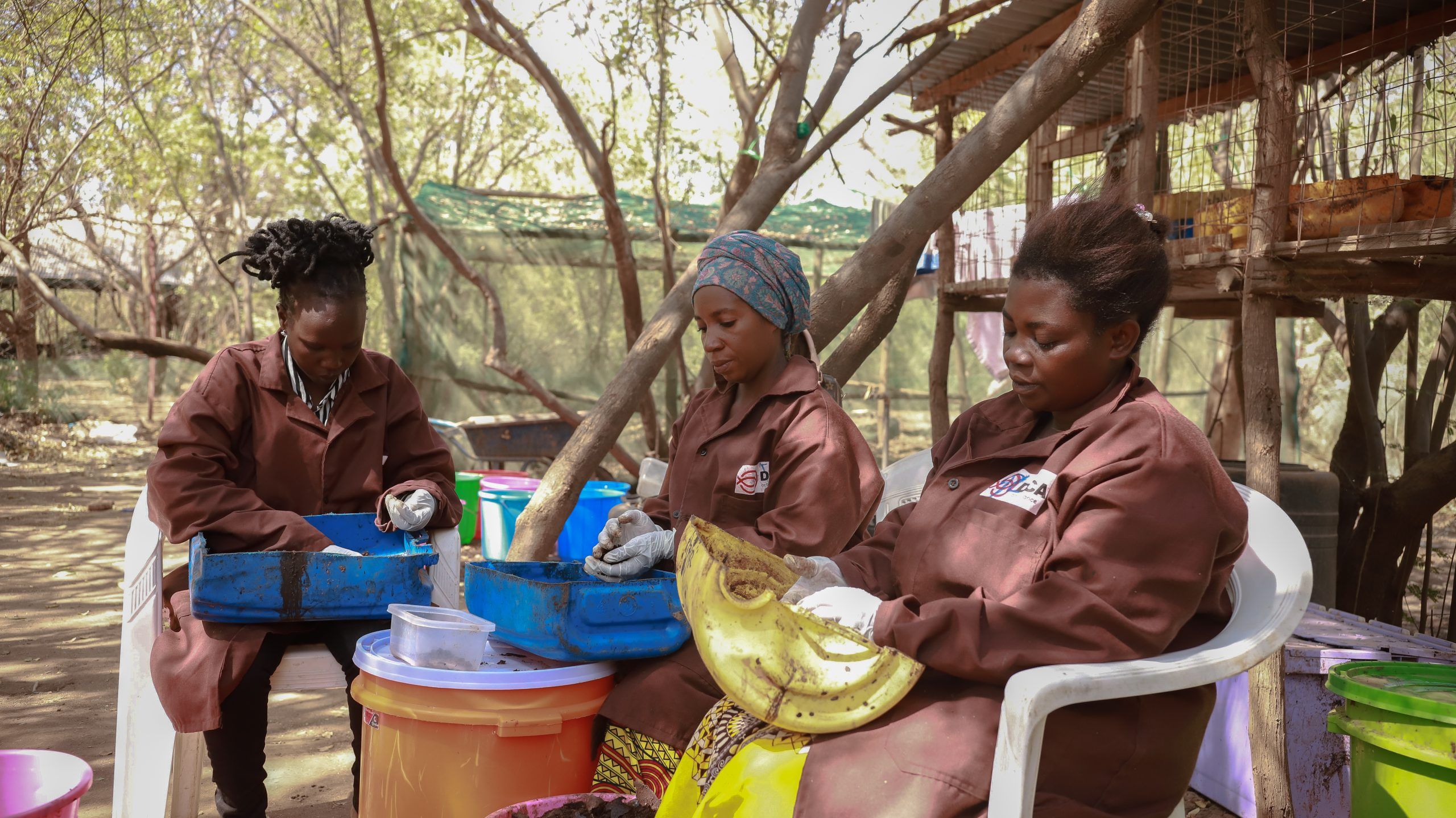In the midst of densely populated Kakuma town and refugee camp in Northwestern Kenya, there is a fly farm. Under the shade from the canopies of a handful of trees three women sit on white plastic chairs. Behind them are wooden structures draped in fine mesh cloth. Each of the women is holding a half-cut plastic container in her lap, sorting larvae. Soon, the larvae will develop into black soldier flies.

“Insects are the future!” proclaims Dorothy Nyangena with a big smile. She oversees the project in which soldier flies play a central role. Her enthusiasm is both genuine and unmistakable.
As Food Security and Livelihoods Officer with DCA Kenya Dorothy knows that the larvae they produce at the farm have the potential to play a vital role in ensuring food and business opportunities for the people of Kakuma – and elsewhere. Now and in the future.
In 2018 DanChurchAid Kenya introduced small-scale poultry farming in Kakuma. However, it turned out that chicken feed is more expensive in Kakuma compared to other places in Kenya.
In fact, chicken feed accounted for up to 70 percent of production costs. As a solution to the expensive feed, they started a pilot project with black soldier flies.
Chicken feed is climate aid in Kenya
Both children and adults experience the enormous consequences of climate change daily. Climate-induced droughts affect farmers’ crops, forcing many to think innovatively to survive.
A sustainable project like the fly farm not only provides food but also offers everyone working there the means to lead a dignified life in an area heavily affected by climate change.
Cheap, easy, and sustainable
The black soldier flies are rich in protein and cost-effective to rear, making them a suitable chicken feed option in Kakuma. The flies have a relatively short life cycle, transitioning from egg to larva to fly within 45 days. The larvae are ready to be used as chicken feed, with about two-thirds of them sorted for feeding, while the remaining third are allowed to become flies to lay new eggs. And with the new eggs the process is repeated.
“We feed the larvae with food waste that we get from local restaurants. The larvae are happy to consume the food scraps, and it reduces the cost of farming the insects,” says Dorothy Nyangena.
The farm receives approximately 180 kilograms of food waste from three restaurants every two days. There is no need to buy or grow food for the larvae and the gap that the insect farming fills completes the circle in a circular economy. Additionally, the larvae produce nutrient-rich fertilizer that can be used in kitchen gardens. Nothing is wasted.
Handing over to the community
By 2023 the project has reached a stage where the local community can take over. Dorothy and the rest of her team have recruited the first group of people who will adopt the technology and make rearing black soldier flies their livelihood. The goal is to encourage more people to turn to insect farming as a livelihood.

“We will continue to work on-site, but it will function as a training facility for people interested in rearing black soldier flies or just wanting to learn more about it. Everyone is welcome,” says Dorothy Nyangena.
Dorothy says that they offer training for rearing black soldier flies on both a small and a large scale. Rearing flies on a household level simply involves feeding the fresh larvae to the chickens. However, for mass production, it requires knowledge of marketing the product and processing the larvae to extend their shelf life.
Development for now and for the future
Dorothy and her team aim to reach out to more people in the local community and encourage them to embrace the new, cost-effective technology. The hope is that as many people as possible can benefit from rearing black soldier flies.
Long-term development is an important goal for DanChurchAid – and addressing climate change is key to any meaningful attempt at creating positive development for the future. That calls for innovative ideas and creative thinking – and the project with black soldier flies is an example of exactly that.

